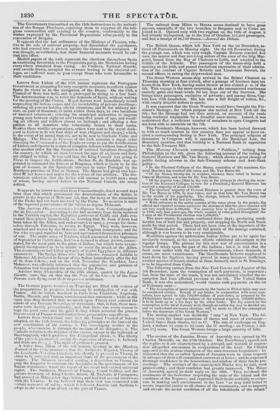It appears by letters received from Constantinople, dated several days
later than that which announced the determination of the Sultan to persist in the deposal of Mehemet Ali, that the news of the submission of the Pasha had not been received by the Porte. No mention is made of the reported perseverance of the Sultan to depose Mehemet.
The Austrian 01,6,Th.c contains intelligence from Constantinople of the 2d December. According to the last accounts from Syria received in the Turkish capital, the Egyptian garrisons of Caiffa and Jaffa eva- cuated those places immediately on learning that St. Jean d'Acre had been taken by the Allies, and endeavoured to open a passage for them- selves through Palestine, to return to Egypt. They were, however, attacked and routed by the Mutualis and Naplous insurgents; and the few who escaped repaired to Acre and surrendered themselves prisoners of war. The entire army of Ibrahim, which amounted in the beginning of September to 75,00e men, had besn reduced to about 20,000, concen- trated, for the most part, iu the plain of Balbec, but which were so com- pletely disorganized as to be unable to resist the attack of the Allies. The mountaineers had killed upwards of 10,000 Egyptians in different encounters. The Syrian tribes who had hitherto remained faithful to Mehemet Ali declared in favour of the Sultan immediately after the fall of St. Jean d'Acre ; and on the 10th November the Seraskier, Izzet Mehemet, was officially informed that the population and garrison of Jerusalem had recognized the authority of the Porte. Advices from Alexandria of the 20th ultimo, quoted by the Lucca Gazette, state, that on that day the flngs of the Cori is of the Four Powers were flying over their respective residences.






















 Previous page
Previous page